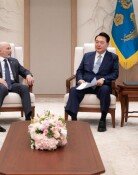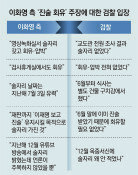Korea’s corporate restructuring tackled by militant labor
Korea’s corporate restructuring tackled by militant labor
Posted April. 08, 2016 07:45,
Updated April. 08, 2016 07:51
The labor union of Hyundai Heavy Industries Co., which saw red ink for nine consecutive quarters, delivered its demands for collective bargaining Thursday, proposing that the company provide overseas training programs for 100 or more union members per year. The union also demanded that the shipbuilder increase bonus payments by 250 percent, twice those of last year, and hire the spouse or a child of a deceased union member. It would cost the company nearly 400 billion won (346.6 million U.S. dollars) annually to implement all the demands.
At a time when the company needs stringent restructuring to overcome its crisis caused by a prolonged slump in the shipbuilding industry, the union must be out of its mind to ask for such expenditures. Hyundai’s union, which seceded from the Korea Confederation of Trade Unions (KCTU) in 2004, is seeking to regain membership of the umbrella labor organization. As nearly half of 750 companies whose labor unions are KCTU members have a hereditary hiring clause in their collective agreements, calls by the government or corporations for greater labor flexibility do not work.
China’s Anbang Insurance Group said Wednesday that it had agreed to buy German insurer Allianz's South Korean businesses for more than 3 million dollars. Allianz acquired Cheil Life Insurance Co. for 400 million won (346.6 million dollars) in 1999 but reportedly decided to sell off the Korean business after failed restructuring due to labor resistance. As the company will fall into the hands of a new owner due to the labor union’s rejection of restructuring, the company’s future will be uncertain.
The rises and falls of global corporations show that the economy’s future depends on labor reforms. When U.S. auto giant GM was reeling from inefficiency and labor disputes in 2008, Japan’s Toyota Motors Corp. dominated the global auto market on the basis of zero labor strike for 64 years. In Korea, stable market leaders have also successfully established win-win labor culture.
Bloomberg News reported Thursday that the gross domestic products of South Korea, Taiwan, Singapore and Hong Kong were all under 3 percent last year, denting the Asian average growth 6.1 percent. Even though the four Asian dragons are struggling, labor and management are looking different ways.
The Korean quantitative easing proposed by Kang Bong-kyun, former finance minister who now heads the ruling Saenuri Party's campaign committee, is a policy of monetary easing on the premise of corporate restructuring. If Korea skips stringent restructuring while implementing the policy, its economy would end up suffering from inflation and capital outflow. The government’s economic team headed by Finance Minister Yoo Il-ho should draw up a practical restructuring plan and start implementing it immediately.







